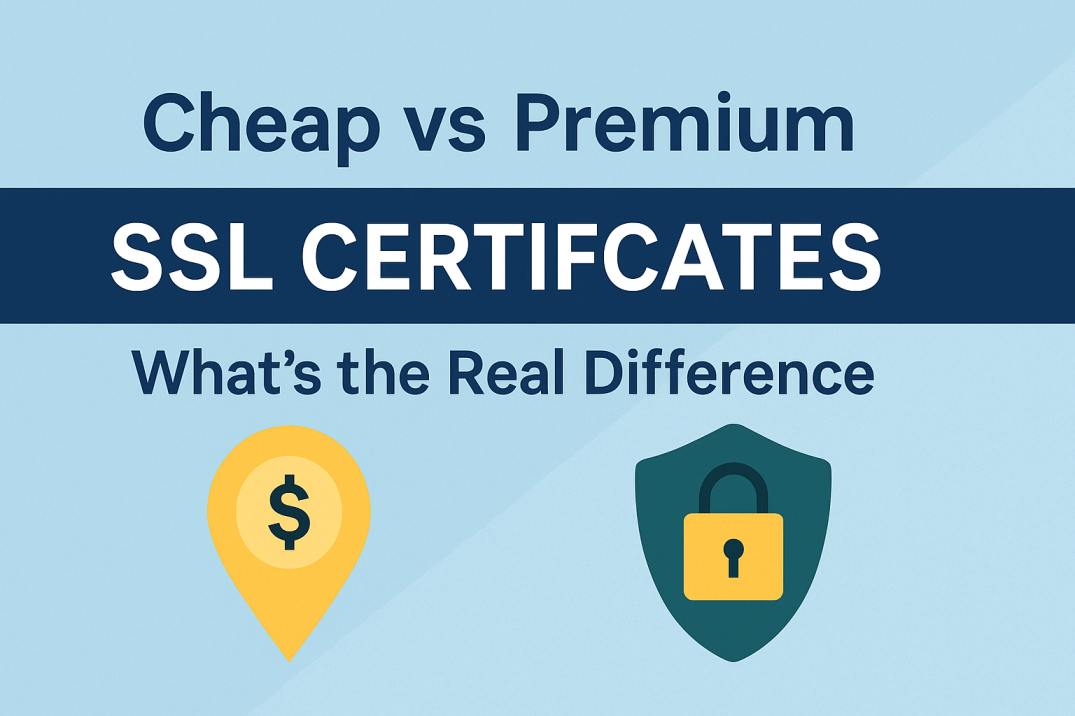


Wondering if premium SSL is worth it? Discover how cheap and premium certificates differ in features, validation, and trust.
With data breaches and digital fraud on the rise, an SSL certificate is no longer optional, it’s a core component of every secure website. Whether you’re running a personal blog or managing an online store, having HTTPS in your URL signals trust and ensures data protection. But when shopping for an SSL certificate, you’re often faced with a familiar dilemma: Should you go with a cheap SSL certificate or invest in a premium one?
First, let’s debunk a common misconception: Cheap SSL certificates don’t mean weak encryption. Whether you’re paying $3.99 or $399, the core technology encryption is the same. SSL certificates, regardless of cost, rely on the same cryptographic algorithms like SHA-256 and RSA 2048-bit keys, both of which meet modern security standards. This means a basic Domain Validated (DV) SSL certificate from cheap certificate authority like Certera offers the same data protection in transit as a high-end from DigiCert or Sectigo. So, if encryption is your primary concern, even a budget certificate does the job.
If all certificates offer similar encryption, why do some cost significantly more than others?: 1. Level of Validation SSL certificates come in three validation types:
Premium certificates usually fall into the OV or EV category, which require human review and corporate documentation, hence the higher cost.
Premium SSL brands like DigiCert, GeoTrust, and Sectigo are recognized worldwide. These certificates often come with additional features such as dynamic site seals and browser interface enhancements. This brand familiarity can instill added confidence in users-especially on transactional or financial websites. In contrast, budget SSL options, such as those offered by Certera, lack global name recognition. While they’re technically sound and browser-trusted, they don’t carry the same psychological weight for end-users who may be unfamiliar with the CA.
Premium certificates usually include extensive customer support, often with 24/7 live assistance, priority case handling, and dedicated account management for large-scale deployments. This can be crucial for businesses that can’t afford downtime or delays during the installation and renewal processes. Lower-cost providers, may offer basic or community-based support, though many do provide live chat and ticket systems. The service may not be as comprehensive, but for simpler websites, it’s often more than enough.
Budget SSL certificates are ideal for:
Another route to inexpensive SSL is through resellers like CheapSSLWeb, for instance, aggregates certificates from multiple CAs like Certera, Sectigo, Comodo, and offers them at steeply reduced prices. It’s essentially a one-stop shop for those who want reliable SSL without the high cost, and it’s especially useful for developers or agencies managing multiple domains.
Premium SSL certificates aren’t always necessary-but in some cases, they’re worth the extra spend:
The added trust from an EV certificate, for example, may provide a psychological edge during checkout or form submissions. In these environments, the perceived trust can be just as important as the technical security.
It’s important to remember that the “premium” label doesn’t automatically mean better security. All SSL certificates, regardless of price, must meet baseline security standards defined by the CA/Browser Forum. Therefore, whether it’s a $4 certificate from CheapSSLWeb or a $200 certificate from a major CA, both will encrypt user data just the same. The real consideration should be the purpose of your site, the audience you’re serving, and the image you want to project.
If you’re running a simple website and need secure HTTPS, a budget certificate from a provider like Certera or a reseller like CheapSSLWeb is a sensible choice. It delivers full encryption, easy setup, and immediate browser compatibility. For most users, it’s everything they need at a fraction of the price.
